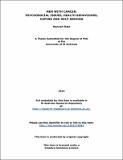Files in this item
Men with cancer : psychosocial issues, health behaviours, coping and help seeking
Item metadata
| dc.contributor.advisor | Humphris, Gerry | |
| dc.contributor.advisor | Ozakinci, Gozde | |
| dc.contributor.author | Dale, Hannah | |
| dc.coverage.spatial | 483 p. | en_US |
| dc.date.accessioned | 2016-06-14T15:08:37Z | |
| dc.date.available | 2016-06-14T15:08:37Z | |
| dc.date.issued | 2016-06-24 | |
| dc.identifier | uk.bl.ethos.687036 | |
| dc.identifier.uri | https://hdl.handle.net/10023/8983 | |
| dc.description.abstract | Background: A range of factors contribute to men with cancer having worse mortality and morbidity rates than women. The research specifically focused on psychosocial issues and health behaviours in men with cancer, and factors affecting help seeking behaviour. Methods: A mixed-methods study recruited adult men with cancer in the East of Scotland. The quantitative cross-sectional study explored psychosocial issues, health behaviours, and desire for support. Data from the Scottish Longitudinal Study were accessed to check sample representativeness. The qualitative study built on the preliminary findings of the quantitative study and used semi-structured interviews to explore factors affecting men’s access to support. Inductive thematic analysis was undertaken. Results: 127 men with cancer completed the questionnaire. Being separated or divorced, younger and living in a high deprivation area was associated with poor psychosocial outcomes and some lifestyle behaviours. Social support was also influential. Twenty participants were interviewed. Appraisal of, and coping with, cancer in addition to biopsychosocial antecedents, the role of masculinity, and service contexts impacted on help seeking. The findings support a modified model of the transactional model of stress and coping relevant to men with cancer, which is new and original since it specifically incorporates the role of masculinity, highlights feedback from coping to appraisal, and recognises important service context factors that impact men’s service access choices. Discussion: Legitimisation of help seeking and the use of emotion-focused coping styles were needed by some men, particularly where ideas about masculinity played a strong role in men’s appraisal of, and coping with cancer. Implications for practice and policy relate to the survivorship agenda given the ongoing support men with cancer may need. Related to this, there is a need to carefully tailor and advertise services to men, and for health professionals to help legitimise the use of certain coping strategies and services. | en_US |
| dc.language.iso | en | en_US |
| dc.publisher | University of St Andrews | |
| dc.rights | Attribution-NonCommercial-NoDerivatives 4.0 International | * |
| dc.rights.uri | http://creativecommons.org/licenses/by-nc-nd/4.0/ | * |
| dc.subject | Health psychology | en_US |
| dc.subject | Oncology | en_US |
| dc.subject | Men's health | en_US |
| dc.subject | Psychosocial issues | en_US |
| dc.subject | Health behaviours | en_US |
| dc.subject | Stress and coping | en_US |
| dc.subject | Help seeking | en_US |
| dc.subject.lcc | RC281.M45D2 | |
| dc.subject.lcsh | Cancer in men--Scotland, East | en_US |
| dc.subject.lcsh | Clinical health psychology--Scotland, East | en_US |
| dc.subject.lcsh | Men--Health and hygiene--Scotland, East | en_US |
| dc.subject.lcsh | Cancer--Psychological aspects | en_US |
| dc.title | Men with cancer : psychosocial issues, health behaviours, coping and help seeking | en_US |
| dc.type | Thesis | en_US |
| dc.type.qualificationlevel | Doctoral | en_US |
| dc.type.qualificationname | PhD Doctor of Philosophy | en_US |
| dc.publisher.institution | The University of St Andrews | en_US |
| dc.publisher.department | NHS Fife | en_US |
The following licence files are associated with this item:
This item appears in the following Collection(s)
Except where otherwise noted within the work, this item's licence for re-use is described as Attribution-NonCommercial-NoDerivatives 4.0 International
Items in the St Andrews Research Repository are protected by copyright, with all rights reserved, unless otherwise indicated.


